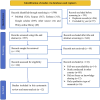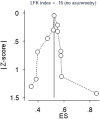Uptake of evidence-based practice and its predictors among nurses in Ethiopia: a systematic review and meta-analysis
- PMID: 39092215
- PMCID: PMC11291372
- DOI: 10.3389/fphar.2024.1421690
Uptake of evidence-based practice and its predictors among nurses in Ethiopia: a systematic review and meta-analysis
Abstract
Background: While evidence-based practice has demonstrated its capacity to enhance healthcare quality and bolster clinical outcomes, the translation of research into clinical practice encounters persistent challenges. In Ethiopia, there remains a dearth of comprehensive and nationally representative data concerning the extent of Evidence-based practice adoption among nurses. Thus, this systematic review and meta-analysis endeavors to assess the overall prevalence of Evidence-based practice implementation and delve into its determinants among Ethiopian nurses. Methods: A systematic review and meta-analysis were conducted following the PRISMA guidelines. In order to identify pertinent studies, a search was conducted across PubMed, Scopus, Google Scholar, and EMBASE databases. A weighted inverse variance random-effects model was employed to estimate the pooled prevalence. Cochrane's Q-test and I2 statistics were calculated to assess heterogeneity among studies. Funnel plots and Egger's test were utilized to evaluate publication bias. Pooled implementation rates and meta-regression analysis were carried out using STATA 17. Results: Of the total 1,590 retrieved articles, twelve studies including 4,933 nurses were included in the final analysis. The pooled prevalence of Evidence-based practice uptake among nurses in Ethiopia is 53% (95% CI: 46%-60%). Having knowledge about Evidence-based practice (AOR = 2.29; 95% CI: 1.90, 2.69; I2 = 70.95%), holding a favorable attitude towards Evidence-based practice (AOR = 2.56; 95% CI: 1.63, 3.49; I2 = 88.39%), occupying a head nurse position (AOR = 3.15; 95% CI: 1.85, 4.46; I2 = 87.42%), possessing effective communication skills (AOR = 4.99; 95% CI: 1.47, 8.51; I2 = 99.86%), and having access to Evidence-based practice guidelines (AOR = 1.90; 95% CI: 1.55, 2.24; I2 = 57.24%) were identified as predictors of the uptake of Evidence-based practice. Conclusion: Only half of Ethiopia's nurses exhibit a strong embrace of Evidence-Based Practice within clinical settings, underscoring the urgent necessity for coordinated endeavors to cultivate this essential practice. Possessing knowledge, effective communication skills, access to updated guidelines, maintaining a positive attitude towards Evidence-Based Practice, and holding a position as head nurse emerged as predictors of successful implementation of Evidence-Based Practice. Hence, policymakers must prioritize capacity-building initiatives, disseminate the latest EBP guidelines widely, and strengthen mentorship roles for head nurses. Systematic Review Registration: https://www.crd.york.ac.uk/prospero/#searchadvanced, identifier CRD42023488943.
Keywords: Ethiopia; evidence based practice; meta-analysis; nurses; predictors; systemic review; uptakes.
Copyright © 2024 Wudu, Tarekegn, Wondifraw, Birhanu, Hailu, Bekalu, Yosef and Belete.
Conflict of interest statement
The authors declare that the research was conducted in the absence of any commercial or financial relationships that could be construed as a potential conflict of interest.
Figures





References
-
- Alemayehu A., Jevoor P. C. (2021). Utilisation of evidence-based practice and its associated factors among nurses. Indian J. Continuing Nurs. Educ. 22 (2), 180–187. 10.4103/ijcn.ijcn_101_20 - DOI
-
- Alqahtani N., Oh K. M., Kitsantas P., Rodan M., Innab A., Asiri S., et al. (2022). Organizational factors associated with evidence-based practice knowledge, attitudes, and implementation among nurses in Saudi Arabia. Int. J. Environ. Res. Public. Health 19, 8407. 10.3390/ijerph19148407 - DOI - PMC - PubMed
-
- Alshammari M. S., Alshurtan R., Alsuliman G., Alshammari M., Alhamazani H., Alshammry S., et al. (2021). Factors affecting the implementation and barriers to evidence-based practice among nurse practitioners in hail region, Saudi Arabia. Nurse Media J. Nurs. 11, 187–196. 10.14710/nmjn.v11i2.38329 - DOI
Publication types
LinkOut - more resources
Full Text Sources

